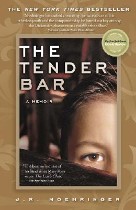 J.R. Moehringer •
J.R. Moehringer •
The Tender Bar •
How the New York Times ever let this guy get away is a mystery to me. He’s a brilliant writer, and every chapter in The Tender Bar is a self-contained gem.
Moehringer grew up in a working-class enclave on Long Island, living with an extended family that didn’t quite extend to his radio-announcer father. For me, the most poignant image in the whole book—and there are many—is that of young J.R. twirling the radio knobs from one end of the dial to the other, hoping to catch the sound of his father’s voice.
Fortunately, the town is home to a bar called Dickens (later renamed Publicans), with its crowd of beer-drinking, baseball-playing, language-loving regulars who adopt the boy as mascot and surrogate son. Here he finds camaraderie, acceptance, and abundant models of manhood. The book is a love song to that pub, those men, and the distinctly masculine phenomenon of bar as community.
While attending Yale, Moehringer dates a young woman who makes him feel unsophisticated by comparison; one of his drinking cronies advises succinctly, “Next time some broad tells you to take her to a museum . . . take her to f—ing Cooperstown.”
Tender may seem an odd way to describe a tavern, until you consider that Publicans is a character, one whose death you eventually mourn just as the author does. But the story comes full circle in a fitting epilogue, and you walk away richer for having made the bar’s acquaintance.






Your email address will not be published.